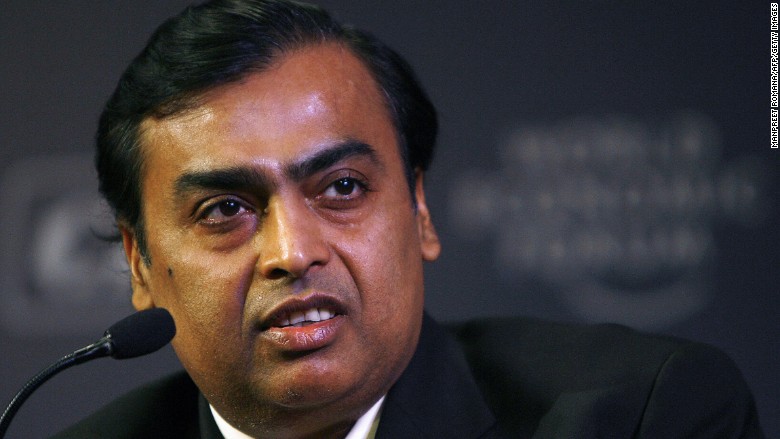India's richest man is rolling out a $20 billion mobile network that could bring lightning-fast Internet to hundreds of millions of people.
Indian consumers are already celebrating the arrival of Mukesh Ambani's
new Reliance Jio service, seizing on the billionaire's promise to
deliver rock bottom prices and download speeds that will enable
streaming of video.
The 4G network,
which reaches more than 80% of the country, officially went live Monday
with a set of generous introductory offers. Indians will be able to use
Jio for free until the end of 2016, and pay as little as 149 rupees
($2.25) a month for data after that.
"Anything and everything
that can go digital is going digital -- at an exponential rate," Ambani
told investors last week at his company's annual general meeting. "Life
is going digital."
Only one fifth of adults in India have
access to the Internet. Few public Wi-Fi spots exist, and fast broadband
connections require infrastructure that is rarely found in poorer urban
areas, much less rural ones.
But that is changing fast. If the
Jio network succeeds, Ambani will be able to capitalize on a seismic
shift that could see hundreds of millions of Indians come online in the
coming years -- in most cases via a smartphone.
It's a market that tech industry giants desperately want to crack. Google (GOOG) has installed free Wi-Fi at train stations across India, and Facebook (FB, Tech30) tried to offer a free version of its platform.

Ambani has invested billions constructing nearly 100,000 telecoms
towers across India. He estimates that Jio already covers some 18,000
cities and 200,000 villages. By March 2017, his aim is to reach 90% of
the population.
Building a national 4G network from scratch
represents a major risk for Ambani, who got out of telecoms about 15
years ago after a dispute with his brother, Anil Ambani, who controls
Reliance Communications.
The brothers, who together are
estimated to be worth $26 billion, have patched things up in recent
years. Jio will be able to use radio frequencies owned by Reliance
Communications.
Rival networks have responded to the launch of Reliance Jio with
special offers of their own, making a price war a near certainty. Airtel
has slashed its prices for 3G and 4G service by 80%, and Vodafone (VOD) has boosted the amount of data in its plans by nearly 70%.
If Jio, which means "live life" in Hindi, is to become another mega
business in Reliance's stable of energy, media, chemicals and retail
operations, the network will have to be able to handle the load from
millions of new customers.
On Tuesday in New Delhi, a device on
the Reliance network was showing impressive download speeds of 21
megabits per second. With $20 billion at stake, that kind of performance
needs to be replicated across India.
